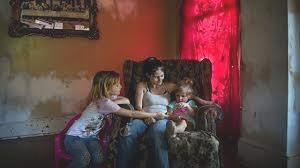 The Household Pulse Survey, an ongoing program of the U.S. Census Bureau conducted during the period January 26th through February 7th, 2020 disclosed widespread food scarcity and housing insecurity in homes with young children. Highlights of the survey included:-
The Household Pulse Survey, an ongoing program of the U.S. Census Bureau conducted during the period January 26th through February 7th, 2020 disclosed widespread food scarcity and housing insecurity in homes with young children. Highlights of the survey included:-
- Approximately 42 percent of adults living in homes with children under five years of age were unable to work due to a lack of child-care, inability to pay for the service or concerns over safety. This finding directly relates to the inability of QSRs and other employers to recruit and retain unskilled single mothers suggesting the need for more extensive programs of childcare and related feeding and medical resources in inner cities.
- Of adults living in households with children receiving food assistance over the seven-day period preceding the survey, 21 percent were unable to pay utility bills in full during the previous twelve months.
- Ten percent of adults living in homes with children experienced food scarcity during the seven days preceding the survey.
 Seven percent of adults are not current on either rent or mortgage payment and are unaware how they will be able to make the next remittance.
Seven percent of adults are not current on either rent or mortgage payment and are unaware how they will be able to make the next remittance.
- Approximately one-third of adults living in households with young children are not current on rent or mortgage and anticipate eviction or foreclosure in the proximal two months.
- Approximately one-third of adults living in households with children under five years of age experienced difficulties in paying households expenses.
It is evident that support programs at the federal and state levels should be refined to address specific needs of recipients. Mechanisms should be developed to uplift potentially productive workers from poverty and to break the cycle of successive generations of dependency.